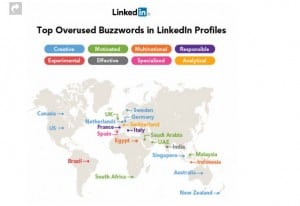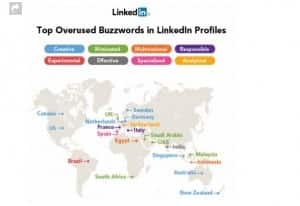 A recent Mashable article indicated the top 10 ‘overused buzzwords on Linked In. You can read the entire article here to find out about all the buzzwords, but one of the top ones was “creativity” – and it makes sense to me that the whole world, in attempting to be unique, ends up resembling each other in multiplicity.
A recent Mashable article indicated the top 10 ‘overused buzzwords on Linked In. You can read the entire article here to find out about all the buzzwords, but one of the top ones was “creativity” – and it makes sense to me that the whole world, in attempting to be unique, ends up resembling each other in multiplicity.
Interestingly, creativity isn’t a term that most accountants would begin with. I had one accountant tell me that creativity was for budgets; rules were for profit and loss statements. And even the creativity of coming up with a budget is so restricted that it may not be recognisable as creativity. Many accountants simply avoid creativity like the plague – or they know themselves to be fearful of it. Creativity infers flexibility, new ideas, change, risk, and a willingness to step outside the mould (or break it altogether). It is found in art, music, photography, writing – and it’s tempting, as an accountant helping your clients to understand the financial rules and follow them, to brush off the concept of creativity and leave that for others who are more flexible, more able to work outside the box. But even if the word ‘creativity’ is overused, its root function is not – the world can always use a little more creativity, a little break from the norm.
Here, then, are a few tips on helping creativity flourish in your accounting firm, without sacrificing the very regulations you are bound to uphold:
Think technology, think fast. No matter how quickly you are taking up new technology, your clients (especially those who are of a younger generation) will probably be ahead of you. Consider what you can implement in your practice that will put you light-years ahead of the competition – because in less time than you realise (very likely much less than one light year, much less a year!), they will have caught up, and your new creative clever way of doing business or helping your clients has become standard in the industry. Do you offer or encourage online bookkeeping for your clients? Run webinars? Actively use social media for a customer service channel? Most of these are already becoming expected – how can you step out even further?
Don’t wait until everyone else is doing it. A few years ago having a mobile version of your website was the newest fad, something every marketing expert was telling you to do. Many accountants are still waiting on this (mostly because most accountants’ websites are still fairly dire; I hate to say it, but it’s very true), and one of the main reasons is that everyone is waiting on everyone else. The point with creativity is that you seize the new opportunity even if no one else is doing it yet – and you take the risk that it may or may not be effective. I know a few firms who started blogging years ago, and now they get several leads a week from their website, whereas the rest of the accounting world will need to be writing at triple-speed to catch up. Look at what the media and digital firms are doing, instead of the other accountancy firms, if you want to be on the edge. Write an e-book that is downloadable from your website, and capture email addresses of those who are interested. Then customise your follow up to match their interests.
Let your team suggest new ideas. One of the worst things you can do is tell your team that no idea is a bad idea, or all will be considered, and then never take action on their ideas. The first thing that someone wants when they share a new idea is to be heard – so make sure that there are a variety of ways in your practice that will help your team’s ideas to be truly heard. If ideas are emailed in, don’t just respond with a thanks, really think about the idea and promise to follow up on it. Then make a note in your diary to do that in a week’s time, several weeks’ time, even six months or a year’s time. (Remember, this principle goes for clients too – the first priority always is to ensure that their comments or queries are heard; taking action is equally as important but not as urgent.) Many team members have excellent insights into your clients (they may talk to them more than you do), technology (especially if they are younger than you), and your firm’s systems (they are the ones who use them on a daily basis). Listen, follow up, and take some kind of action – or at the very least, explain clearly why the idea will not be implemented.
Be colourful. Accountants have historically stuck with branding that is very safe, respectable, and professional. Blue. White. Black. Perhaps a slight dash of red or even orange. Consider refreshing your logo or branding, or even getting a full branding review based on the impression you would like your firm to give, and the types of clients you want to work with (rather than simply the ones you have always worked with). Consider your market when reviewing branding – if you want to be working with creative or artistic companies, you’ll need to display the same to them.
Read constantly. One of the challenges of the digital age is that a new (printed) book begins becoming out of date by the time it has been published: but there is still a great deal of extremely valuable knowledge to seize on. And, if creativity is the goal, read what everyone else isn’t reading, or hasn’t heard of yet. Something outwith your industry or area. Perhaps Logo Design Love, a treatise on branding. Or What The Internet Is Doing to Our Brains (not a new book, but still remarkably applicable). Or pick up a few classics to expand your vocabulary and conversation starters. I found an old copy of the Hunchback of Notre Dame which I’m reading now – tough going, compared to many ‘easier’ reads, but it stirs the mind in new ways. I particularly found it funny that this 19th century novel proclaims that “It’s the accursed inventions of the age that are ruining everything – above all, the printing press, that German pest! No more manuscripts – no more books! Printing puts an end to bookselling – the end of the world is coming!” This is faintly reminiscent of those who proclaim that the internet is putting an end to books. Perhaps the bookshop has suffered, but who knows that it may not yet revive? That we are not already becoming weary of the constant connection, and the hotels who proudly proclaim that they are internet and signal-free, so as to ensure a real break from the world, are busier than ever. Reading – and engaging with the culture of the day as well as the past – opens up avenues of creativity.
Practice left-brain, right-brain alternatives. If you are typically left-brain, expand the other side of your brain with a few short exercises. Download this left-brain, right-brain exercise and feel your mind beginning to open up. Consider using it in a team meeting, or at a speaking event. (I have used it in the past with great success.)
Creativity is like a muscle – when not exercised, it becomes weak and pathetic. Soon you are only doing what you have always done, and it doesn’t seem to matter whether it’s new or different. The tried and tested often lasts well – but true creativity is fresh and alert.
And it doesn’t join forces with the top ten buzzwords, either. If you’re going to use the word to describe yourself, be prepared to submit examples of how it’s true…or else you’re just part of the crowd.

